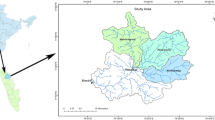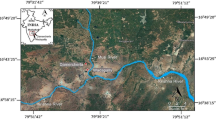Abstract
The cumulative and detailed knowledge about the present and past ecological systems is “traditional ecological knowledge” (TEK). TEK in water is to be provided for by guaranteeing environmental flow sufficiency. Environmental flow in terms of fish habitat is the minimum flow required to breed fish species and their corresponding environmental condition. The Pandoh Hydropower project in the Mandi District was constructed in 1977 by obstructing the flow of the Beas River. This in turn causes the natural free-flowing flow to get altered, leading to a poor fish ecosystem. To mitigate the impact, the maintenance of environmental flow has been proposed. The percentage of the environmental flow to be maintained is still debatable. The research work focuses on evaluating the impact of a hydropower project on the aquatic ecosystem. The environmental flow has been suggested as the mitigation measure. The hydraulic-habitat approach has been used to calculate the required environmental flow for a healthy aquatic ecosystem. The keystone species for this study purpose is rainbow trout. The environmental flow required for the rainbow trout will be taken environmental flow for a healthy ecosystem. The percentage of the environmental flow which is maintained isn’t sufficient as per the results. Hence based on the Traditional Ecological Knowledge, the percentage of the environmental flow is proposed as 20–25% of the average lean season flow to enhance the aquatic biodiversity.
Access this chapter
Tax calculation will be finalised at checkout
Purchases are for personal use only
Similar content being viewed by others
References
Arthington AH, Stuart EB, Leroy NP, and Robert JN (2006) The challenge of providing
Berkes F, Colding J, Folke C (2000) Rediscovery of traditional ecological knowledge as adaptive management. Ecol Appl 10(5):1251–1262
Bovee KD (1986) Development and evaluation of habitat suitability criteria for use in the instream flow incremental methodology (21). National Ecology Center, Division of Wildlife and Contaminant Research, Fish and Wildlife Service, US Department of the Interior
Building Block Methodology. Water Research Commission. WRC Report No TT 354/08. 364 p
Bunn SE, Angela HA (2002) Basic principles and ecological consequences of altered Flow regimes for aquatic biodiversity. Environ Manag 30:492–507. https://doi.org/10.1007/s00267-002-2737-0
Chandy T, Keenan RJ, Petheram RJ, Shepherd P (2012) Impacts of hydropower development on rural livelihood sustainability in Sikkim, India: community perceptions. Mt Res Dev 32(2):117–126
Chen J (2016) Research of impacts on the eco-environment of hydraulic and hydropower construction. In: 2016 7th international conference on mechatronics, control and materials (ICMCM). Atlantis Press
Cranney K, Tan PL (2011) Old knowledge in freshwater: why traditional ecological knowledge is essential for determining environmental flows in water plans. Australas J Nat Resour Law Policy 14(1–2):71–113
Desai AY (2012) Development of a hydraulic sub-model as part of a desktop environmental flow assessment method (Doctoral dissertation Rhodes University) environmental flow rules to sustain river ecosystems. Ecol Appl 16(4):1311–1318. https://doi.org/10.1890/1051-0761
Extence CA, Balbi DM, Chadd RP (1999) River flow indexing using British benthic macroinvertebrates: a framework for setting hydroecological objectives. Regul Rivers: Res Manag 15(6):545–574
Faisal AA, Polthanee A, Promkhambut A (2014) Farmers’ perception of drought and its impact on a community livelihood in rural Northeastern Thailand. Khon Kaen Agric J 42(3):427–442
Goguen G, Caissie D, El-Jabi N (2020) Uncertainties associated with environmental flow metrics. River Res Appl 36(9):1879–1890
Hayes DS, Brändle JM, Seliger C, Zeiringer B, Ferreira T, Schmutz S (2018) Advancing towards functional environmental flows for temperate floodplain rivers. Sci Total Environ 633:1089–1104
Herrera IA, Burneo PC (2017) Environmental flow assessment in andean rivers of Ecuador, case study: Chanlud and El Labrado dams in the Machángara River. Ecohydrol Hydrobiol 17(2):103–112
Hickey JT, Huff R, Dunn CN (2015) Using habitat to quantify ecological effects of restoration and water management alternatives. Environ Model Softw 70:16–31
King JM, RE Tharme, MS De Villiers (2008) Environmental flow assessments for rivers: manual for the knowledge. U. T. E. Traditional Ecological Knowledge
Liu C, Zhao C, Xia J, Sun C, Wang R, Liu T (2011) An instream ecological flow method for data-scarce regulated rivers. J Hydrol 398(1–2):17–25
Maddu R, Ganta KM, Shaik R, Dhanya CT (2022) Impact assessment of environmental flows using CORDEX regional climate models: case study of Nagarjuna Sagar Dam, Krishna River, India. Advanced modelling and innovations in water resources engineering. Springer, Singapore, pp 187–204
Marin K, Coon A, Fraser DJ (2017) Traditional ecological knowledge reveals the extent of sympatric lake trout diversity and habitat preferences. Ecol Soc 22(2)
Monico V, Solera A, Bergillos RJ, Paredes-Arquiola J, Andreu J (2022) Effects of environmental flows on hydrological alteration and reliability of water demands. Sci Total Environ 810:151630
Nguyen H, Pham T, Lobry de Bruyn L (2017) Impact of hydroelectric dam development and resettlement on the natural and social capital of rural livelihoods in Bo Hon Village in Central Vietnam. Sustainability 9(8):1422
Pastor AV, Ludwig F, Biemans H, Hoff H, Kabat P (2013) Accounting for environmental flow requirements in global water assessments. Hydrol Earth Syst Sci Discuss 10(12)
Prakasam C, Saravanan R (2020) Environmental flow—A mitigation measure for impact of hydropower projects. Sustainable civil engineering practices. Springer, Singapore, pp 207–213
Prakasam C, Saravanan R, Kanwar VS (2021) Evaluation of environmental flow requirement using wetted perimeter method and GIS application for impact assessment. Ecol Ind 121:107019
Richter BD, Davis MM, Apse C, Konrad C (2012) A presumptive standard for environmental flow protection. River Res Appl 28(8):1312–1321
Richter BD, Jeffrey VB, Jennifer P, David PB (1996) A method for assessing hydrologic alteration within ecosystems. Conserv Biol 10(4):1163–1174
Sehgal KL (1999) Coldwater fish and fisheries in the Indian Himalayas: rivers and rivers. Fish and fisheries at higher altitudes: Asia. Food Agric Organ U N Tech Pap 385:41–63
Tagliari MM, Levis C, Flores BM, Blanco GD, Freitas CT, Bogoni JA et al (2021) Collaborative management as a way to enhance Araucaria Forest resilience. Perspect Ecol Conserv 19(2):131–142
Usher PJ (2000) Traditional ecological knowledge in environmental assessment and management. Arctic 53(2):183–193
Wineland SM, Bașağaoğlu H, Fleming J, Friedman J, Garza‐Diaz L, Kellogg W et al (2022) The environmental flows implementation challenge: insights and recommendations across water‐limited systems. Wiley Interdiscip Rev Water 9(1):e1565
Yarnell SM, Willis A, Obeste A, Peek RA, Lusardi RA, Zimmerman J et al (2022) Functional flows in groundwater-influenced streams: application of the California environmental flows framework to determine ecological flow needs. Front Environ Sci 9:788295. https://doi.org/10.3389/fenvs.2021.788295
Zhang H, Sun T, Xue S, Yang W, Yin X (2017) Environmental flow assessment in estuaries taking into consideration species dispersal in fragmented potential habitats. Ecol Ind 78:541–548
Author information
Authors and Affiliations
Corresponding author
Editor information
Editors and Affiliations
Rights and permissions
Copyright information
© 2022 The Author(s), under exclusive license to Springer Nature Switzerland AG
About this chapter
Cite this chapter
Prakasam, C., Saravanan, R. (2022). Estimation of Environmental Flow Using Traditional Ecological Knowledge and Conservation of Fish Biodiversity. In: Rai, S.C., Mishra, P.K. (eds) Traditional Ecological Knowledge of Resource Management in Asia. Springer, Cham. https://doi.org/10.1007/978-3-031-16840-6_18
Download citation
DOI: https://doi.org/10.1007/978-3-031-16840-6_18
Published:
Publisher Name: Springer, Cham
Print ISBN: 978-3-031-16839-0
Online ISBN: 978-3-031-16840-6
eBook Packages: Social SciencesSocial Sciences (R0)




